Book3unit1Grammar
- 格式:doc
- 大小:49.50 KB
- 文档页数:6
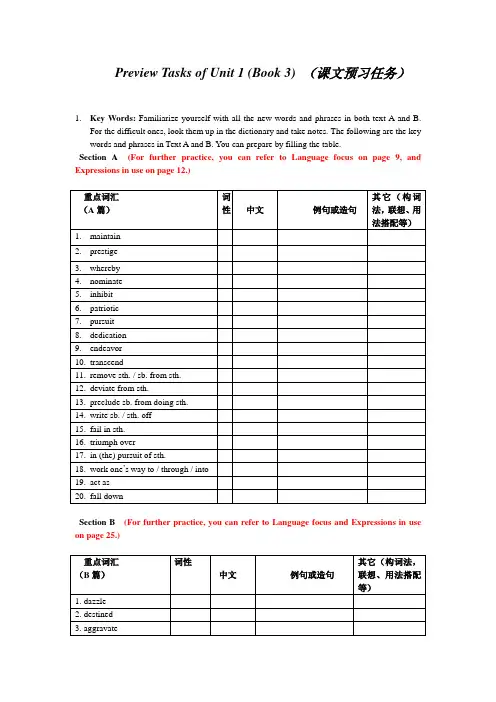
Preview Tasks of Unit 1 (Book 3) (课文预习任务)1.Key Words: Familiarize yourself with all the new words and phrases in both text A and B.For the difficult ones, look them up in the dictionary and take notes. The following are the key words and phrases in Text A and B. You can prepare by filling the table.Section A (For further practice, you can refer to Language focus on page 9, and Expressions in use on page 12.)Section B (For further practice, you can refer to Language focus and Expressions in use on page 25.)2.Text: Read Text A through and get ready for the teacher’s check on your understanding.(To check your understanding, you may refer to Reading Comprehension on page 9)Read Text B through and get ready for some text-related exercises.(To check your understanding, you may refer to Reading Comprehension on page 24)3.Difficult sentences:Mark the following difficult sentences in text A, make sure you understand them, and get ready for paraphrase and oral translation.1)No task is too hard. No amount of preparation is too long or too difficult. (Para.3)2)Yet his strong will was the spur that pushed him forward, strengthening hisoptimism, dedication and determination. (Para.4)3)Only those who “keep their eyes on the prize”, those who uphold a committedand focused will and spirit, will find their endeavors successful. (Para.5)4)It’s not how man y times you fall down that matters. It’s how many times youget back up that makes success! (Para.7)5)With hard work, determination, dedication and preparation, you can transcendany handicap, accomplish any feat, and achieve success! (Para.8)4. Grammar & Sentence pattern:Translate the following sentences into English with the expression or requirement in the racket.1) 在优势不是因为学生箱作弊,而是因为老师没有叫他们如何准确地转述。
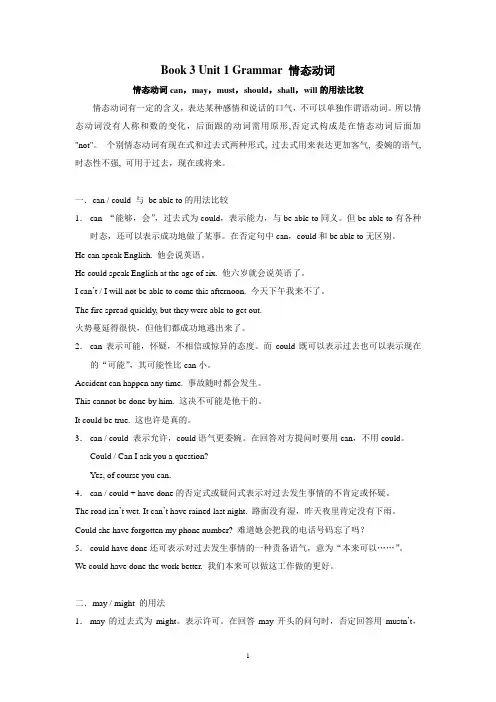
Book 3 Unit 1 Grammar 情态动词情态动词can,may,must,should,shall,will的用法比较情态动词有一定的含义,表达某种感情和说话的口气,不可以单独作谓语动词。
所以情态动词没有人称和数的变化,后面跟的动词需用原形,否定式构成是在情态动词后面加"not"。
个别情态动词有现在式和过去式两种形式, 过去式用来表达更加客气, 委婉的语气, 时态性不强, 可用于过去,现在或将来。
一.can / could 与be able to的用法比较1.can “能够,会”,过去式为could,表示能力,与be able to同义。
但be able to有各种时态,还可以表示成功地做了某事。
在否定句中can,could和be able to无区别。
He can speak English. 他会说英语。
He could speak English at the age of six. 他六岁就会说英语了。
I can’t / I will not be able to come this afternoon. 今天下午我来不了。
The fire spread quickly, but they were able to get out.火势蔓延得很快,但他们都成功地逃出来了。
2.can表示可能,怀疑,不相信或惊异的态度。
而could既可以表示过去也可以表示现在的“可能”,其可能性比can小。
Accident can happen any time. 事故随时都会发生。
This cannot be done by him. 这决不可能是他干的。
It could be true. 这也许是真的。
3.can / could 表示允许,could语气更委婉。
在回答对方提问时要用can,不用could。
-Could / Can I ask you a question?-Yes, of course you can.4.can / could + have done的否定式或疑问式表示对过去发生事情的不肯定或怀疑。
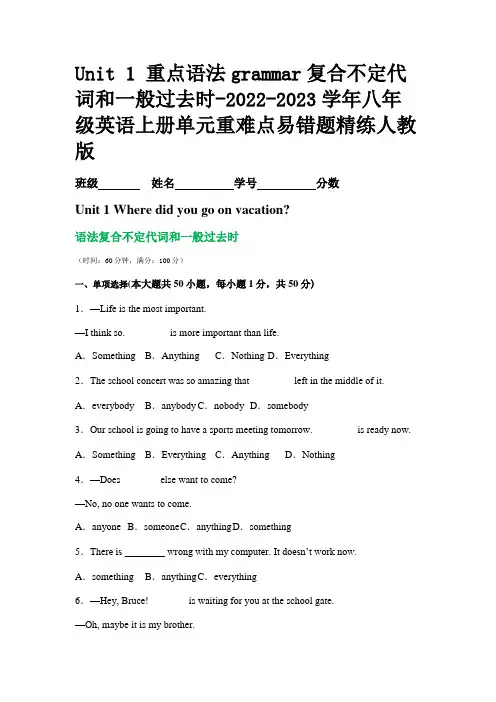
Unit 1 重点语法grammar复合不定代词和一般过去时-2022-2023学年八年级英语上册单元重难点易错题精练人教版班级姓名学号分数Unit 1 Where did you go on vacation?语法复合不定代词和一般过去时(时间:60分钟,满分:100分)一、单项选择(本大题共50小题,每小题1分,共50分)1.—Life is the most important.—I think so. ________ is more important than life.A.Something B.Anything C.Nothing D.Everything2.The school concert was so amazing that ________ left in the middle of it. A.everybody B.anybody C.nobody D.somebody3.Our school is going to have a sports meeting tomorrow. ________ is ready now. A.Something B.Everything C.Anything D.Nothing4.—Does _______ else want to come?—No, no one wants to come.A.anyone B.someone C.anything D.something5.The re is ________ wrong with my computer. It doesn’t work now. A.something B.anything C.everything6.—Hey, Bruce! _______ is waiting for you at the school gate.—Oh, maybe it is my brother.A.Someone B.Anyone C.Everyone7.A bus hit a tree this morning. Luckily, ________ was hurt.A.somebody B.anybody C.everybody D.nobody8.—I didn’t eat ________ this morning. I’m hungry.—There are ________ cookies in my bag. Would you like ________? A.anything; some; someB.anything; some; any C.something; any; some 9.—Where did you go? I visited you, but ________ was in.—I went fishing with my friends all afternoon.A.nobody B.somebody C.everybody D.anybody10.—Excuse me, is there ________ important in today’s newspaper?—Let me see. Oh, China sent its Tianhe Space Station Core Module (核心舱) on April 29th, 2021.A.anything B.something C.everything D.nothing11.There isn’t ________ interesting in the newspaper.A.something B.anything C.nothing D.everything12.—Have you brought the book we need now?—Sorry, I was in such a hurry that I didn’t bring _________ with me. A.anything B.something C.nothing D.everything13.I’d love to visit ________.A.anywhere warm B.warm anywhereC.somewhere warmD.warm somewhere14.I’d like to go ________.A.to somewhere peaceful B.to peaceful somewhereC.somewhere peaceful D.peaceful somewhere15.Almost ________ in our group visited the history museum last weekend. A.anyone B.everyone C.someone16.I’ve waited for a long time. I hope not to have ________ to do. A.something boringB.anything boring C.something bored17.There isn’t ________ interesting or surprising in the newspaper today. A.something B.everything C.anything D.nothing18.—Are you free tomorrow? Let’s go skating.—All right. I have ________ to do.A.nothing B.something C.anything D.everything19.—What do you think of My Country, My Parents?—Wonderful. But I don’t think _________ will like it.A.somebody B.anybody C.everybody D.nobody20.—Tom, there’s ________ on TV. Let’s play chess.— Sounds good.A.anything interesting B.interesting anything C.nothing interesting D.interesting nothing21.—Sam, today is Mother’s Day.—Let’s buy ______ for our mother after school.A.something special B.anything specialC.special something D.special anything22.—Doctor, what’s wrong wit h my mom?—Don’t worry. It is ________ serious. It’s only a cold.A.nothing B.something C.anything D.everything23.—I find more and more people begin to exercise to keep healthy these days.—Yeah. ________ is more important than our health.A.Something B.Anything C.Nothing D.Everything24.—Will you buy ________ on your vacation, Mary?—Yes, I am going to buy some beautiful paintings for my mother. A.something special B.special somethingC.anything special D.special anything25.—Is there ________ in the classroom?—No, I can see ________ there.A.anybody; somebody B.somebody; anybody C.nobody; anybody D.anybody; nobody26.I don’t feel very well today. I don’t want to have ________.A.something B.nothing C.anything D.some27.—Did you meet ________?—Yes. I met some very interesting people.A.someone interesting B.anyone interesting C.interesting someone D.interesting anyone28.I am hungry now. I want ________ to eat.A.something nice B.nice something C.something bad29.I couldn’t find ________ in the English newspaper. So I took down some new words instead.A.something interesting B.anything interestingC.interesting something D.interesting anything30.Lucy is really kind and friendly. ________ in the class likes her. A.Someone B.Anyone C.Everyone D.No one31.The old woman hid the box in such a safe place that she believed ________ would find it.A.anybody B.nobody C.somebody D.everybody32.Sorry for being late. ________urgent happened on my way here. A.something B.nothing C.anything D.everything33.—Laura, ________ called you just now when you were out.—Thank you. It must be my mom.A.nobody B.anybody C.everybody D.somebody34.—Don’t smoke here.Look at the sign!—Sorry, I ________ see that.A.don’t B.won’t C.didn’t D.haven’t35.—I have seen the fashion show on TV with my cousin at home.—When _________ you _________ it?A.will; see B.have; seen C.did; see D.do; see36.I ________ shy. Doing projects with others has helped me become outgoing. A.was used to be B.was used to being C.used to be D.used to 37.—When ________ your father ________ this car?—About half a year ago.A.has; bought B.have; bought C.will; buy D.did; buy38.I’m sorry you’ve missed the train. It ________ five minutes ago.A.will leave B.has left C.left D.leaves39.Why are you so late? The parade ________ twenty minutes ago.A.has begun B.has been C.began D.has been on40.It only ________ me half an hour ________ to school every day last term. A.takes; to ride B.spent; to ride C.cost; walk D.took; to walk41.I ________ that new movie with my friends last month. It’s amazing.A.watch B.watched C.watches D.have watched42.I was busy last night. I ________ a model plane with my father.A.make B.made C.am making D.have made43.Not long ago, he ________ a birthday present for his mother.A.has bought B.bought C.buys D.will buy44.We ________ two hours on the trip to the park. It was too ________. A.spend; bored B.take; boring C.spent; boring D.took; bored45.The town ________ a lot of pollution in the past but it is not a problem any more. A.has B.is having C.will have D.had46.—Could I use your dictionary, Tom? Mine is at home.—Sorry. I ________ it to my cousin yesterday.A.lend B.lent C.borrow D.borrowed47.—I ________ a traffic accident yesterday. Many passengers werehurt.—That’s terrible!A.saw B.watched C.looked D.see48.My father used to __________ to work, but now he is used to __________ to work.A.drive; walk B.driving; walkC.driving; walking D.drive; walking49.Mary ________ down on the ground and soon fell ________.A.lied; asleep B.lay; sleep C.laid; sleeping D.lay; asleep 50.Shanghai Disneyland has attracted millions of people since it ________ in 2016. A.opens B.is open C.opened D.has opened二、用所给单词的正确形式填空(本大题共15小题,每小题2分,共30分)51.My father ________(drive)me to school, but now I take the underground all by myself.52.There _________ (be) clean and fresh air here several years ago.53.The Women’s World Cup ________(not begin)until 1991 when China hosted it in Guangzhou.54.He ________(write)the famous novel when he was sixty years old.55.He said that he _________(begin)to learn French when he was only six years old.56.The old man put on his hat and then ________ (leave) the office.57.My sister received the offer, but she ________ (refuse).58.—Who ________ (throw) the waste here?—The workers of that factory did.59.My mother ________ (pay) 55 yuan for the meat yesterday.60.This dictionary _________ (cost) me 10 yuan.61.My car _______ (break) down on the way, so I had to call 122 for help. 62.The minute I ______ (sit) down in front of the TV, my mom came over. 63.He _________ (live) in Wuxi two years ago.64.Larry with his friends_______(visit) museums last month.65.Last Christmas, I ________ (hide) a gift from my son, but he found it out easily.三、句型转换(本大题共10小题,每小题2分,共20分)66.I felt disappointed at the result.(对划线部分提问)__________________ you feel at the result?67.My sister read an interesting story book in the library. (对划线部分提问)________ ________ your sister read in the library?68.This problem is so difficult that nobody can work it out.(同义句转换)This problem is ________ difficult for ________ to work out.69.He didn’t accept to take part in this activity. (改为同义句)He ________ ________ take part in this activity.70.We spent the whole day visiting Hong Kong Disneyland. (改为同义句)It _________ _________ the whole day to visit Hong Kong Disneyland.71.I bought something in the shopping center (改为一般疑问句)________you________________in the shopping center?72.She met someone interesting at the party. (改为否定句)She ______ ______ ______ interesting at the party.73.Everyone wants to talk to him.(改为否定句)________ ________ ________ to talk to him.74.Walt Disney created Disneyland in the USA.(改为一般疑问句)________ Walt Disney ________ Disneyland in the USA?75.The clerk led the boy to the reception desk(改为否定句)The clerk ________ ________ the boy to the reception desk.参考答案:1.C【解析】句意:——生命是最重要的。
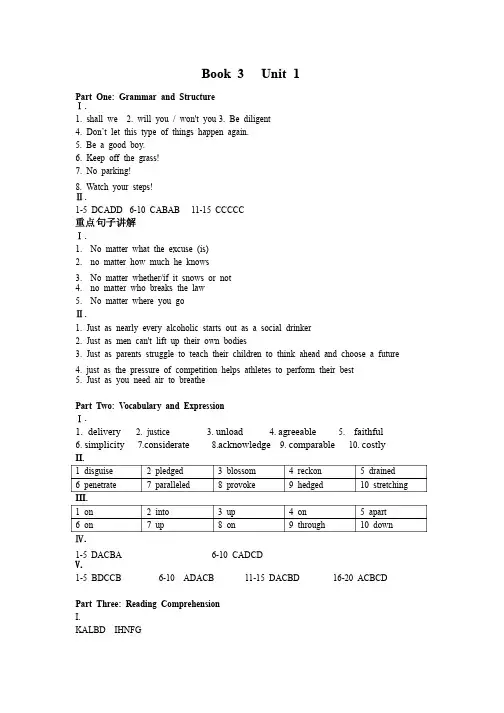
Book 3 Unit 1 Part One: Grammar and Structure Ⅰ. 1. shall we2. will you / won't you 3. Be diligent 4. Don’t let this type of things happen again.5. Be a good boy. 6. Keep off the grass! 7. No parking! 8. Watch your steps! Ⅱ. 1-5 DCADD 6-10 CABAB 11-15 CCCCC 重点句子讲解Ⅰ. 1.No matter what the excuse (is) 2.no matter how much he knows 3.No matter whether/if it snows or not 4.no matter who breaks the law 5.No matter where you go Ⅱ. 1. Just as nearly every alcoholic starts out as a social drinker 2. Just as men can't lift up their own bodies 3. Just as parents struggle to teach their children to think ahead and choose a future 4. just as the pressure of competition helps athletes to perform their best 5. Just as you need air to breathe Part Two: Vocabulary and Expression Ⅰ. 1. delivery2. justice 3. unload4. agreeable5. faithful6. simplicity7.considerate8.acknowledge9. comparable10. costlyII. 1 disguise 2 pledged 3 blossom 4 reckon 5 drained 6 penetrate 7 paralleled 8 provoke 9 hedged 10 stretching III. 1 on 2 into 3 up 4 on 5 apart 6 on 7 up 8 on 9 through 10 down Ⅳ.1-5 DACBA 6-10 CADCD V.1-5 BDCCB 6-10 ADACB 11-15 DACBD 16-20 ACBCD Part Three: Reading Comprehension I. KALBD IHNFG II. 1-5 CBCDB 6-10 CDDCB III. 1. The young are not what they were. 2. Events that the older generation remembers. 3. Enforced slavery. 4. Enjoyment is not sinful. 5. The younger generation. Part Four:TranslationⅠ. Translate the following into English.1.a difficult delivery 2.to hold together 3.to adjust to 4.to reconcile … with …5.to pray for peace 6.to restrain from 7.to long to do sth 8.to care for sb 9.to enrich one’s life10.to hold each other tight II. Translate the following into Chinese.1.带着…的表情的表情2.执法, 执行审判职权执行审判职权3.全力以赴全力以赴4.误导某人做某事误导某人做某事5.对…不抱希望不抱希望6.在精心伪装下在精心伪装下7.依靠自己活得有声有色依靠自己活得有声有色8.一脸的木然一脸的木然9.能容苦和乐的家能容苦和乐的家10.热闹欢快的氛围热闹欢快的氛围III. Translate the following sentences into Chinese.1.在自传的第二卷,她进一步深入提示她的艺术人生。
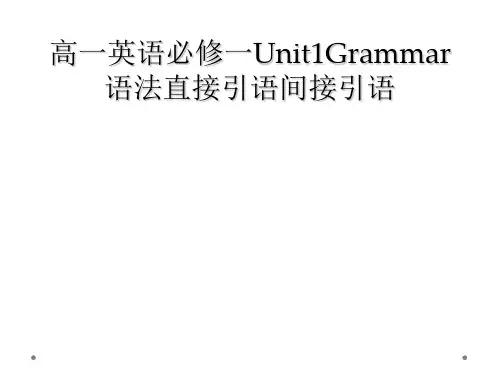

Book 3 Unit 1Vocabulary1. I was speaking to Jane on the phone when suddenly we were___.(当我和Jane通着电话的时候我们突然被打断了)A. cut offB.cut downC.cut backD.cut out解析:cut off切断,打断,迅速离开,(疾病等)使人死亡cut down裁短,减少,缩小(尺寸,数量,或数目),砍倒cut back减少,缩减(尤指经费或生意),消减,修剪cut out停止,裁剪,取下,取代2. Peter complained to the owner of the book store that there were some pages ___ in the dictionary.(Peter向书店的老板投诉字典有几页纸是丢失的)A.LosingB.missingC.droppingD.falling解析:losing失败的,输的missing失去的,下落不明的,丢失的dropping滴下,滴下物,掉落的filling落下的,下降的(1.单个现在分词做定语时,大凡放在被修饰词之前,说明被修饰名词的性质或特征等,构成前置定语;现在分词短语做定语时,大凡放在被修饰词之后,构成后置定语,如missing in the dictionary .2.-ing表主动,现在进行状态,因此多用来形容事情或东西,因为这个事情或东西会对人造成影响。
)3. The shop-assistant was straightforward with her customers. If an article was of __ quality she’dtell them so.(这位商店售货员是不去与顾客绕圈子的。
如果一个商品的品质低微,她会这个事情如实地告诉顾客)A. miserableB.minorC.subordinateD.inferior解析:Miserable a.悲凉的,令人痛苦的,卑劣的(指因贫弱,可怜或屈辱等外部因素给人造成精神痛苦,忧愁或肉体折磨,令人同情和可怜)Minor a.较小的,少数的,小音阶的(多指与别的比较后显得不严重,或指较少,较小)n.未成年人,副修科目Subordinate a.级别或职位较低的,下级的,次要的n.部下,下级Inferior a.(质量等)低微的,下等的4. With all its advantages the laptop is by no means without its__.(A.limitationB.boundariesC.restraintsD.confinements解析:Limitation n.限制,局限(较通用,可指人为的规定,也可指客观存在的构成限制的事实或情况)Boundary n.分界线,范围(球场的)边线(亦可指两地间的分界线,如用篱笆或墙隔开的分属于例外的土地分界线)Restraint n.抑制,克制,控制,拘束,约束力(指现存的限制或制约因素,可能是由于他人的决定而存在于自身之外的限制,也可能是由于担心别人的想法而自设的限制)Confinement n.监禁,关押,限制,约束,分娩5. Look at the photo and you will find Diana __ her father.(看这幅照片,你会发现Diana长得像她爸爸)A. takes toB. takes afterC. takes forD. takes over解析:Take to喜欢,习惯于…,开始从事,觉得(某事)简易学Take after长得像,性格类似于,效仿Take for为…承担…,信以为真,认为理所当然Take over带,接管,帮…学习,在…上花费6. I want to buy a new tie to __ this brown suit.(我想买一条新的领带与这件棕色的西装相配)A.go into B.go afterC.go by D.go with解析:Go into进入,从事,进入(某种状态),调查Go after追逐,追求,跟随Go by时光流逝,顺便走访,判断,经过Go with相伴,跟…相配,跟…谈恋爱,赶时髦7. He __ his lessons about Italy with photographs of the people who live there.(他用一些住在那里的人的照片来说明有关于意大利的课)A.illustratedB.citedC.quotedD.explained解析:Illustrate v.说明,表明,给…加插图Cite v.引用,引证,表扬(可指提及原因或举出示例,比quote正式,常用于较正式的场合,如说明法律文件)Quote v.引述,引用(指举例说明)Explain v.讲解,解释,辩解8. In addition to rice we need to __ our diet with fish meat and vegetable.(除了米饭之外,我们还要在我们的日常饮食中补充鱼肉蔬菜)A.replace .B.supplementC.replenishD.mix解析:Replace vt.替换,替代,把…放回原位Supplement vt.增补,补充n.增补,补充物,增刊Replenish vt.补充,从头装满Mix v混合n食物混合配料,乐曲组合(可指将食物物质混合在一起,也可指颜色,情感,品质融合在一起)9. What he has doneis __ the doctor’s orders.(他所做的事情违反了医生的嘱咐)A.subject to B.opposite C.resistant to D.contrary to解析:Subject n主题,话题adj须服从…的,(在君主等)统治下的v提供提出Be subject to受支配,从属于使经受,使遭受Opposite adj相对的对立的对面的n对立面对立物bBe opposite to在…对面,与…相反Resistant adj抵抗的有抵抗力的,顽强的n抵抗者,防腐剂Be resistant to抵抗对…有耐药力的Contrary adj相反的违反的对立的任性的Be contrary to与…相反10. The survival __ of some wild animals is not high because they are ruthlessly (无情地)huntedfor their skins.(这些野生动物的存活率并不高因为它们的皮总被无情猎取)A.ratioB.degreeC.rateD.scale解析:Ratio n比,比率,系数,比例(大凡指两个数字的比例)Degree n音阶,度度数程度学位Rate n速度,比率(使用比较广)),等级(利息等)费率v评估(专指评定价值等的凹凸),评价,责骂Scale n规模比例级别v测量,攀登11. Tim is good smart and hardworking. __ I can’t speak too highlyof him.(Tim是一位友情聪惠,刻苦的人总之,我怎么夸奖他都不过分)A. As a resultB. In a wordC. By the wayD. On the contrary解析:As a result结果,因此In a word总之,一句话,简言之By the way顺便地附带说说,随便一提On the contrary与此相反,正相反,反倒,反而12. What he told me about the affair(事情)simply doesn’t make any __(他所跟我说的那件事根源没有任何意义)A.ideaB.senseC.meaningD.significance解析:Make sense讲得通有意义,是明智的13. The lawyer’s question was a __ that cause the defendant(被告人)to admit his guilty.(这位律师的问题是一个使被告人承认他的罪过的圈套)A.planB.trapC.tapD.plot解析:Plan n计划打算,平面图v计划打算,设计(通常但不总是指较长远的计划或安排)Trap v诱骗,困住n圈套,(对付人的)计谋,夹子Tap vt开发,汲取(液体)vi轻声走,拍(多指慢慢地持续地轻击轻拍)n龙头,阀门,塞子Plot n地基,(戏剧或小说的)情节一块地v密谋,设计情节14. Why can’t you do this small __ for me? I’v helped you often enough inthe past.(为什么你连这么点忙都不帮我?我过去那么经常帮助你)A.demandB.requestC.favorD.requirement解析:Demand v要求,询问(指严正地问质问)n要求(指剧烈要求,坚决要求),需求销路Request n要求,需要申请书vt(下级对上级的)请求,索取,邀请(作要求请求时:正式用词,指非常正式有礼貌地请求或恳求,多含担心因种种原因对方不能答应的意味)Favor n好感,宠爱关切,关心,恩惠(可根据英英词典给出的解释理解:an act ofgracious kindness)vt支持赞成照顾,促成Requirement n要求,必要条件,必需品,资格15. I know you think I’m talking nonsense(胡话)Tom but __ you will realize that I was right.(我知道你觉得我是在说胡话Tom,但是你迟早会意识到我是对的)A.at one timeB.in timeC.at timesD.on time解析:At one time一度,以前In time迟早,最后及时,经过一段时间以后At times有时间或On time按时准时,正点Grammar1.__ the dog was the first animal to be domesticated(被驯服了的)is generally agreed upon byauthorities(权威)in the field.(狗是第一种家养动物(这一观点)在该领域得到权威的认可)A. UntilB. It wasC. WhatD. That解析:分析句子结构得.__ the dog was the first animal to be domesticated(被驯服了的)为主语从句,此时主语从句表达的是一个事实从句中结构统统所以用that引导。
](https://uimg.taocdn.com/b56df0754b73f242336c5f6b.webp)
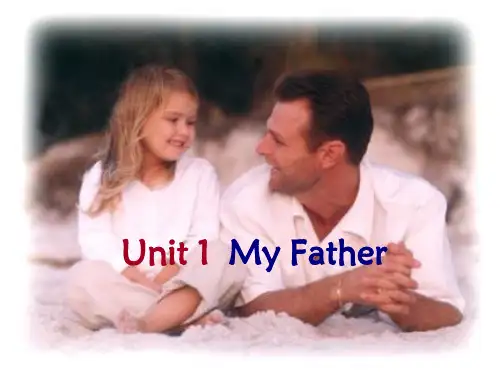
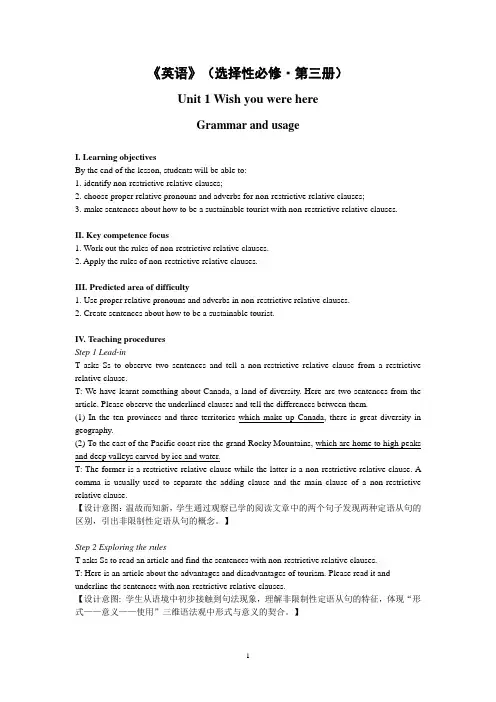
《英语》(选择性必修·第三册)Unit 1 Wish you were hereGrammar and usageI. Learning objectivesBy the end of the lesson, students will be able to:1.identify non-restrictive relative clauses;2.choose proper relative pronouns and adverbs for non-restrictive relative clauses;3.make sentences about how to be a sustainable tourist with non-restrictive relative clauses.II. Key competence focus1. Work out the rules of non-restrictive relative clauses.2. Apply the rules of non-restrictive relative clauses.III. Predicted area of difficulty1. Use proper relative pronouns and adverbs in non-restrictive relative clauses.2. Create sentences about how to be a sustainable tourist.IV. Teaching proceduresStep 1 Lead-inT asks Ss to observe two sentences and tell a non-restrictive relative clause from a restrictive relative clause.T: We have learnt something about Canada, a land of diversity. Here are two sentences from the article. Please observe the underlined clauses and tell the differences between them.(1) In the ten provinces and three territories which make up Canada, there is great diversity in geography.(2) To the east of the Pacific coast rise the grand Rocky Mountains, which are home to high peaks and deep valleys carved by ice and water.T: The former is a restrictive relative clause while the latter is a non-restrictive relative clause. A comma is usually used to separate the adding clause and the main clause of a non-restrictive relative clause.【设计意图:温故而知新,学生通过观察已学的阅读文章中的两个句子发现两种定语从句的区别,引出非限制性定语从句的概念。
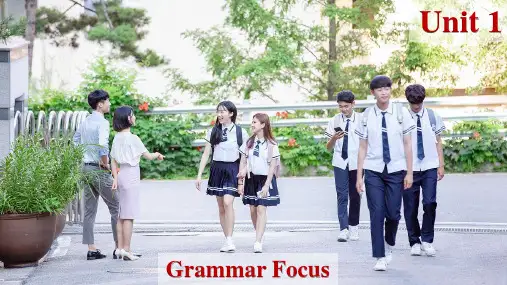
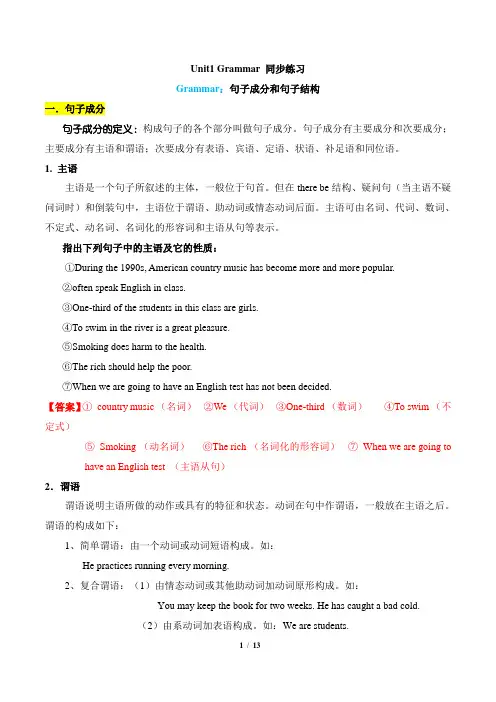
Unit1 Grammar 同步练习Grammar:句子成分和句子结构一.句子成分句子成分的定义:构成句子的各个部分叫做句子成分。
句子成分有主要成分和次要成分;主要成分有主语和谓语;次要成分有表语、宾语、定语、状语、补足语和同位语。
1. 主语主语是一个句子所叙述的主体,一般位于句首。
但在there be结构、疑问句(当主语不疑问词时)和倒装句中,主语位于谓语、助动词或情态动词后面。
主语可由名词、代词、数词、不定式、动名词、名词化的形容词和主语从句等表示。
指出下列句子中的主语及它的性质:①During the 1990s, American country music has become more and more popular.②often speak English in class.③One-third of the students in this class are girls.④To swim in the river is a great pleasure.⑤Smoking does harm to the health.⑥The rich should help the poor.⑦When we are going to have an English test has not been decided.【答案】①country music (名词)②We (代词)③One-third (数词)④To swim (不定式)⑤Smoking (动名词)⑥The rich (名词化的形容词)⑦When we are going tohave an English test (主语从句)2.谓语谓语说明主语所做的动作或具有的特征和状态。
动词在句中作谓语,一般放在主语之后。
谓语的构成如下:1、简单谓语:由一个动词或动词短语构成。
如:He practices running every morning.2、复合谓语:(1)由情态动词或其他助动词加动词原形构成。
一、用适当的关系代词或关系副词填空1. She lives in a small village, ________ is only three miles from here.2. She is going to spend the winter holiday in Beijing, ________ she has some friends.3. They will put off the sports meeting till next Sunday, ________ they won’t be too busy.4. The sun gives the Earth light and heat, ________ is necessary to living things.5. Those ________ want to go the computer room should write their names here.6. There are players from China, some of ________ are our old friends.7. They work in a factory ________ makes radio parts.8. They work in a factory ________ radio parts are made.9. This is the vision phone ________ parts are made in China.10. Do you know the student ________ was praised at the meeting?二、阅读下面短文, 在空白处填入适当的关系代词或关系副词Going to America three years ago was an unforgettable experience for me. Though I can’t remember everything 1. ________ happened in the USA, I still remember some people and things 2. ________ were related to her. One afternoon, we went to the biggest bookshop 3. ________ there were different kinds of books to be sold. I bought a grammar book and she purchased the same books 4. ________ I did. Just when we left the bookshop, a big man stopped us and robbed me of my necklace 5. ________ had been handed down from my grandmother, 6. ________ story behind it was amazing. I will never forget that time 7. ________ she risked her life to help me. And one of her hands got injured badly, 8. ________ made me very sad. That is the reason 9. ________ I regard her as one of the best gifts 10. ________ destiny sent to me.三、用适当的关系代词或关系副词把下列句子改写为非限制性定语从句1. I’m reading Harry Potter and the Philosopher’s Stone. It is an interesting book.__________________________________________________________________2. He failed in the exam. It made his parents very angry.__________________________________________________________________3. He has two sons. Both of them are doctors.__________________________________________________________________4. Recently I bought an ancient Chinese vase. The price of it was very high.__________________________________________________________________5. Last week, two persons came to see the house. Neither of them wanted to buy it.__________________________________________________________________ 6. I have lost my pen. My father bought it for my sixteenth birthday.__________________________________________________________________ 7. Do you see the house? The windows of it face south.__________________________________________________________________ 8. He must be from Africa. It can be seen from his skin.__________________________________________________________________ 9. The book is worth reading. He paid 6 yuan for it.__________________________________________________________________ 10. She is a teacher of much knowledge. Much can be learned from her.__________________________________________________________________答案:一、1.which 2.where 3.when 4.which 5.who6.whom7.which/that8.where9.whose 10.who二、1.that 2.that 3.where 4.as 5.which/that6.whose7.when8.which9.why 10.that三、1. I’m reading Harry Potter and the Philosopher’s Stone, which is an interesting book.2. He failed in the exam, which made his parents very angry.3. He has two sons, both of whom are doctors.4. Recently I bought an ancient Chinese vase, the price of which/of which the price/whose price was very high.5. Last week, two persons came to see the house, neither of whom wanted to buy it./Last week, two persons came to see the house, which neither of them wanted to buy.6. I have lost my pen, which my father bought for my sixteenth birthday.7. Do you see the house, the windows of which of which the windows/whose windows face south?8. He must be from Africa, which can be seen from his skin.9. The book, which he paid 6 yuan for, is worth reading.10. She is a teacher of much knowledge, which can be learned from her.。
工业学院教案课程:大学英语(3)学期:20 —20 学年第一学期教师:工业学院教案Unit 1说写课(第1次课)The first 50 minutes:Step1: Term plan and pre-reading activities. (15 minutes)1.Introduce the term plan of learning English and some changes in teachingincluding how to grade English in this term.2.Talk about the topic “The way to success” and ask students how to define “success”.Do the pre-reading activities on page 2 (listening).Step 2: Text A reading comprehension.1.Ask the students to read Text A within 15 minutes and raise questions about textunderstanding.2.Discuss and find answers to questions on page 9: understanding the text andcritical thinking (for critical thinking questions, the teacher had better ask the students to choose only one or two to discuss). While the students are discussing, the teacher may walk around and offer some help. Then, ask one or two students to report their discussion results. (20 minutes)The second 50 minutes:Step3: Key words, phrases and expressions. (15 minutes)Step 4: Functional patterns. (15 minutes)Use the following patterns to make sentences.1. He was not a good student, and had he not been from a famous family, he probably would have been removed from the school…... (L2, Para.1)“had he not been …”为倒装的虚拟条件句,相当于“if he had not been……”。